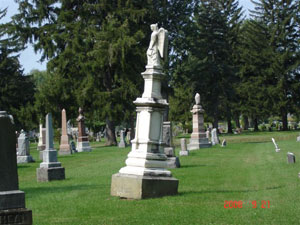This site was founded by the late John Skakel. Contact us HERE
Cemeteries Office Staff have asked that users NOT contact them with questions directly.
Unusual Cemetery Terms?

The Goodyear Angel in a tipped position
Photo by Bruce Warwick
RIP -- rest in peace
Relict (of) -- widow (of)
SOE -- Sons of England
Requiescat in pace, Wikipedia states that his is a latin phrase stating "May He (or she) Rest in Peace!" In other words the long form of RIP above.
"Astra castra, Numen lumen" (the stars are my camp, the deity my light) was the motto of the Knights of the Maccabees.
Mizpah (emotional bond), an emotional bond between people who are separated (Caution - Wikipedia)
COCF It seems that The Canadian Order of the Chosen Friends (aka COCF or as seen on tombstones - OCF) was formed in 1887 – It was a Fraternal Society that provided people with insurance(s) policies. Their Head Office was in Hamilton, Ontario. It is said they eventually became what today is known as Reliable Life Insurance Co. It was similar to the Canadian Order of Foresters.
Woodmen of the World.
The Woodmen of the World Crest is on many stones in our Cemeteries. On their web site Woodmen of the World have the following information. This is a direct quote from their web site and MUST NOT be reproduced in any way. It is posted here for educational purposes only.
The largest fraternal benefit society with open membership in the United States, Woodmen of the World was founded in Omaha, Neb., by Joseph Cullen Root on June 6, 1890. From its humble beginnings more than a century ago, Woodmen of the World has grown into a financial services organization large enough to offer security, but small enough to still care about each individual member.
In the beginning, there was no office space. The first Woodmen of the World certificates were issued from the home of Secretary John T. Yates. The organization opened its first office when space was donated rent-free for six months by the owner of the Sheeley Block at 15th and Howard Streets in Omaha.
The first certificate of membership was issued to William A. McCully of Independence, Kan., on December 29, 1890. Six months later, Woodmen of the World paid its first death claim on the life of teenager Willie O. Warner who drowned on June 14, 1891, in Niles, Mich.
Woodmen of the World's first financial statement, dated December 31, 1891, listed receipts of $59,753.31 and disbursements of $58,876.22, with a balance on hand of only $877.09. By 1900, the Society had $219 million of life insurance in force.
Helping those in need Joseph Cullen Root founded Woodmen of the World on June 6, 1890 Joseph Cullen Root
In addition to providing life insurance protection to members, Root believed that Woodmen of the World members, through their local lodges, should be an active volunteer force within their communities, helping those in need.
The first test of Root's fraternal vision came in 1900 when a tidal wave devastated Galveston, Texas. Root, who was visiting the city along with Woodmen of the World Treasurer Morris Sheppard, led relief efforts. Within a short time Root also had Woodmen erect a memorial to the event.
Today, the organization continues to provide disaster relief efforts through the Woodmen of the World/American Red Cross partnership. More than 1,600 Woodmen of the World volunteers belong to 160 disaster action teams nationwide, providing relief efforts in their local communities.
Fraternalism gets a boost
In 1944, Woodmen of the World President Farrar Newberry formed a National Service Committee composed of 12 members from across the nation to suggest ways of encouraging the growth of Woodmen of the World lodges through community activities.
A Fraternal Service Fund, approved early in 1946, was established to provide matching funds to local lodges for the relief, health, recreation and entertainment of members, beneficiaries and their families. At that same time, renewed interest was shown in Woodmen of the World's youth program.
Youth Activities
The first Boys of Woodcraft club was organized by Dr. J.N. Taylor in Jacksonville, Fla., in 1903. In 1947, however, a name change along with the addition of outdoor activities and summer camps led to growing popularity. The groups were called Sportsmen's Clubs, and youth members, now called Rangers, enjoyed a variety of volunteer and social activities, and summer camp.